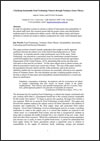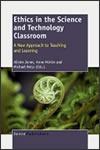Element 4 Aspect 2: Assessment
Teacher Education – Pre-service
Element 4
Aspect 2: Assessment
Describes assessment practices appropriate to technology education.
Aspect Purpose
To help student teachers understand assessment practices that enhance the learning process and outcomes.
Key Words: Assessment practices, learning process, outcomes
Resources
Book Chapter
"Learning technological problem solving – A cognitive/epistemological perspective"
Review statement
As the title suggests, the article presents a cognitive/epistemological (knowledge or understanding) perspective of technological problem solving. The article, based on work being done in kindergartens as part of the "Designing Minds" project, presents the rationale and conceptual framework of the project as well as descriptions of the components of the model developed by the project.
The "Designing Minds" model is based on five main strands.
- The designed/artificial world
- Problem solving
- Design
- Notations
- Understanding and constructing artificial behaviour.
The paper provides interesting examples of implementation of each of these strands.
Results from the project lead the writer to make two important claims.
- Claim 1 – Teaching/learning technological problem solving should be integral to the early stages of children's intellectual development
- Claim 2 – Teaching/learning technological problem solving should be based on students' evolving cognitive models of the design process.
The paper provides plenty of "food for thought" regarding technological problem solving and how it might be approached with young learners. There can be a tendency for educators to think that design and technological problem solving is the domain of older students but this paper shows that young children are very capable in these areas and makes a strong case for beginning this learning as early as possible
Reference
Mioduser, D. (2009). "Learning technological problem solving – A cognitive/epistemological perspective". In A. Jones and M. de Vries (Eds.), International Handbook of Research and Development in Technology Education (pp. 391-406). Rotterdam: Sense Publishers.
Keywords: cognitive, epistemological, problem solving, design
Review by Mike Forret.
Conference Paper
"Enhancing student learning in technology through enhancing teacher technological literacy"
Review statement
This paper presents one perspective about how to enhance learning in technology.
Of particular interest is an excellent section that discusses the important role of formative assessment in technology education. This section clearly articulates how formative feedback can support and enhance learning in technology.
Reference
Moreland, J., Jones, A., & Chambers, M. (2001,October). Enhancing student learning in technology through enhancing teacher technological literacy. Paper presented at technology Education New Zealand Conference, Wellington, New Zealand.
Keywords: Formative assessment
Reviewed by Moira Patterson.
Book Review

Clarifying Sustainable Food Technology Futures through Technacy Genre Theory
Review Statement
In order for education systems to nurture a culture of innovation and sustainability in the school staff room, this research asserts that far greater clarity and classification methods need to be employed to define exactly what the subject matter and learner attributes in schools are meant to address compared to the wider world demands upon it.
This paper presents research recently undertaken that sought to clarify apparent confusion between the school view of the field of knowledge known as "Food Technology" in Australia and the wider professional views of the same.
Food Technology was selected as a curriculum issue for clarification research because world food supplies have reached serious levels of concern (Food and Agriculture Organisation of the United Nations, 2010), demanding that society develop more innovators in this area for our future. Yet the same subject area in school systems can often be presented in much more conservative forms.
The core of this paper clarifies the perceptions between schools and the wider profession, and in this process identifies whether the two domains of practice are essentially referring to two separate forms of Technacy Genre. The role education can play in helping prepare society to develop a culture of innovation and sustainability around food practice is crucial and deserves clarification.
This paper offers a useful overview of food technology in the first instance. Also highlights issues around sustainability.
Reference
Turner, A., and Seemann, D. Clarifying Sustainable Food Technology Futures through Technacy Genre Theory. Southern Cross University, Coffs Harbour NSW 2450, Australia.
Keywords: Food Technology; Technacy Genre Theory; Sustainability; Innovation; Curriculum and Food Science Education
Reviewed by Wendy Fox-Turnbull.
Book Review

Ethics in the science and technology classroom
Review Statement
This edited book on ethics represents the outcomes of an international collaborative project that examined the role and place of bioethics in science and technology curricula.
As science and technology advance, ethical issues increasingly are brought to the fore not only for both scientists and technologists but also for the general public.
Science and technology education also reflects this shift and thinking, and teaching about ethics in the school curriculum has increased. A greater emphasis is being placed on society's general scientific and technological literacy and this includes an understanding of socio-scientific issues including ethical decision-making.
Although this book has a focus on ethics in the school science and technology curriculum, we believe it will also prove useful for those thinking about ethical decision making in a range of contexts outside of the school sector. The book will prove useful for University lecturers, teachers, curriculum developers, and policy makers and those that are involved in science and technology decision making more broadly.
Reference
Jones, A., McKim, A., and Reiss, M. (2010). Ethics in the science and technology classroom. Sense Publishers, 2010 - 144 pages books.google.co.nz/books?sitesec=reviews&id=2AP8RQAACAAJ.
Keywords: ethics, science, technology, technology education
Reviewed by Mike Forret.
Book Review
Design and Technology: Inside the Black Box
Review Statement
This book rests heavily on work from Black and Wiliam's work reported in their book Inside the Black Box and subsequent work by the GL Assessment Reform Group. It works on the premise that assessment should promote students' learning. The booklet offers advice on how to interact with students effectively to promote their learning. The specific aim of the book is the improvement of learning in technology.
Reference
Moreland, J., Alister Jones, A., and Barlex, D. (2008), Design and Technology: Inside the Black Box, The Black Box Assessment for Learning Series. Editors: Paul Black, Christine Harrison, Bethan Marshall and Dylan Wiliam, London: GL Assessment Group. ISBN 978 0 7087 1764 6
Keywords: Formative Assessment, promoting learning, classroom dialogue, feedback, peer and self assessment
Reviewed by Wendy Fox-Turnbull.
Resource
"Technology Indicators of Progression"
Reference:Technology Indicators of Progression.
Review Statement
The Indicators of Progression provide support for teachers to interpret the Achievement Objectives (AOs) for each strand of the technology learning area within The New Zealand Curriculum (NZC) (2007). There are three matrices, each focussed on one of the three strands of the technology curriculum, describing the eight levels of the NZC.
Key phrases: Indicators of Progression, Achievement Objectives, Teacher Guidance, Indicators
